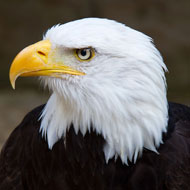
New report identifies those at risk if global warming continues
Climate change threatens nearly half the bird species in the continental United States and Canada - including iconic birds such as the bald eagle - according to a new report published by the US based conservation non-profit organisation the National Audubon Society.
The study, which was funded in part by the US Fish and Wildlife Service, identifies 126 species that will lose more than 50 per cent of their current ranges by 2050 with no possibility of moving elsewhere, and possible extinctions, if global warming continues on its current trajectory.
A further 188 species face more than 50 per cent range loss by 2080 but may be able to make up some of the loss if they are able to colonise new areas. The 314 species include many not previously considered at risk.
Audubon chief scientist Gary Langham, who led the investigation said: "The greatest threat our birds face today is global warming. That's our unequivocal conclusion after seven years of painstakingly careful and thorough research. Global warming threatens the basic fabric of life on which birds - and the rest of us - depend, and we have to act quickly and decisively if we are going to avoid catastrophe for them and for us."
"The prospect of such staggering loss is horrific, but we can build a bridge to the future for America's birds," said Audubon president and CEO David Yarnold. "This report is a roadmap, and it's telling us two big things: We have to preserve and protect the places birds live, and we have to work together to reduce the severity of global warming."
Langham and other Audubon ornithologists analyzed 30 years of North American climate data and tens of thousands of historical bird observations from the Audubon Christmas Bird Count and US Geological Survey's North American Breeding Bird Survey to understand the links between where birds live and the climatic conditions that support them.
While some species will be able to adapt to shifting climates, many of North America's most familiar and iconic species will not. The national symbol of the United States, the bald eagle, could see its current summer range decrease by nearly 75 per cent in the next 65 years.
The common loon, state bird of Minnesota, may no longer be able to breed in the lower 48 states by 2080.
The Baltimore oriole, state bird of Maryland and mascot for Baltimore's baseball team, may no longer nest in the Mid-Atlantic, shifting north instead to follow the climatic conditions it requires.
Other state birds at risk include brown pelican (Louisiana), California gull (Utah), hermit thrush (Vermont), mountain bluebird (Idaho and Nevada), ruffed grouse (Pennsylvania), purple finch (New Hampshire) and wood thrush (Washington, DC).
The report highlights numerous implications for conservation, public policy and further research but also provides a new suite of tools for scientists, conservationists, land managers and policy makers. For example, the study identifies "stronghold" areas that will remain stable for some birds even as climate changes and these are candidates for protection and management.
Image author: Tony Hisgett, Wikimedia Commons CC BY 2.0



 The veterinary mental health charity Vetlife is inviting the veterinary community to join it for a sponsored cold-water dip.
The veterinary mental health charity Vetlife is inviting the veterinary community to join it for a sponsored cold-water dip.